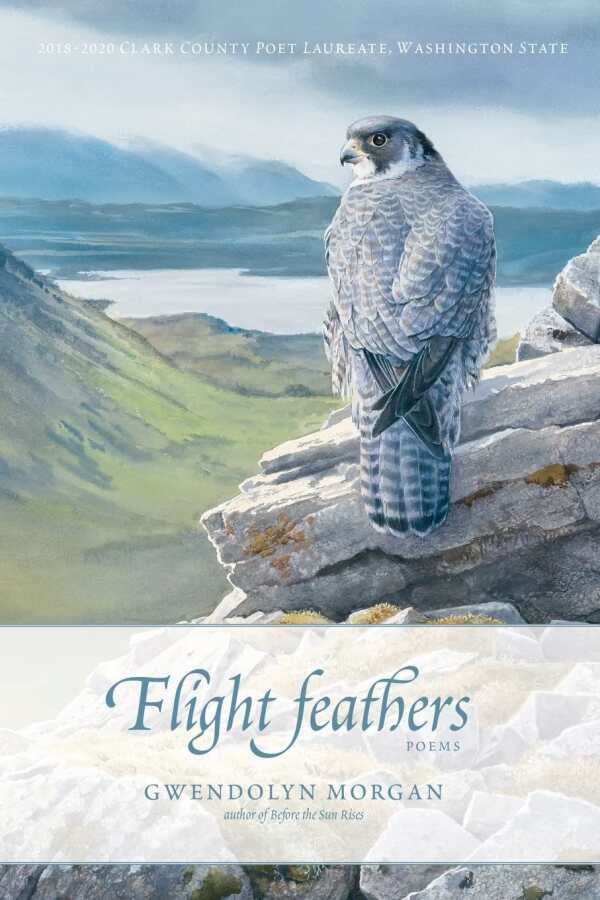Flight Feathers
Paying keen attention to plant and animal life, the poems collected in Flight Feathers reveal shared ecosystems, reveling in the interconnectedness of humanity and nature.
Gwendolyn Morgan’s poetry collection Flight Feathers weaves observations about the natural world with experiences of hospice care, grief, trauma, and death in pandemic times.
These poems depict animals and plants in the Pacific Northwest alongside the comings and goings of a woman from detention centers and hospitals. Organized into three sections (Field Notes, Stencils, and Migrations), the poems juxtapose the diversity and persistence of natural organisms with the precariousness of human life during racist regimes and pandemics.
The entries in the Stencils section are prose poetic, and follow recurring motifs, including a red fox that trots around outside a hospital, and the ways in which bereavement practices work in a time of social distancing. But social justice issues also pervade the collection. “Trauma-informed Care” highlights the separation of parents and children at the US border, noting: “even geese know better / how to care for their young.” As birds migrate, so do people, but Morgan’s witty entwining of the two topics casts doubt on whether people act in kind or cruel ways compared to their natural counterparts.
In “Raccoon, Lady Liberty,” a mother raccoon cries aloud when one of its babies was was trapped. A sudden shift of perspective occurs: “Now she writes letters asking ICE to release babies / children from cages and detention centers, children wailing while / their Mamas’ crying sound / carries across our nation.” Thus the inexorable draw of a mother toward her young is shown to cross species lines; the collection critiques the inhumane acts perpetrated at various levels of society with clarity.
Poems like “3-whorled light” make strong use of alliteration and repetition, referencing “patterns of fern fronts, fragile fern, lady fern, wood fern / leaves of herbs, fused petals, she often names the leaves / one afternoon she can’t seem to name anything / a blur of post-menopausal chemo plus COVID-19 detritus.” Its soft sounds are made to contrast with harder syllables later on, drawing attention to where fragility and resilience meet difficulty and impenetrability. The poem hints at personal struggles, like surviving cancer, while being attuned to larger systemic forms of oppression, too.
The vibrant natural life of the Pacific Northwest populates each page, tempered by human tragedies that unfold like the fronds of a fern, fractal and multifaceted. Where some poems document healthcare worker burnout, others ruminate on the militarization of US culture and the microaggressions directed at people of color. The poems handle traumas with care and sensitivity, though, working to protect the confidentiality of the people who inspired them, including immigrants, health care workers, those who are dying, and those in mourning.
Paying keen attention to plant and animal life, the poems collected in Flight Feathers reveal shared ecosystems, reveling in the interconnectedness of humanity and nature.
Reviewed by
Jeana Jorgensen
Disclosure: This article is not an endorsement, but a review. The publisher of this book provided free copies of the book and paid a small fee to have their book reviewed by a professional reviewer. Foreword Reviews and Clarion Reviews make no guarantee that the publisher will receive a positive review. Foreword Magazine, Inc. is disclosing this in accordance with the Federal Trade Commission’s 16 CFR, Part 255.

